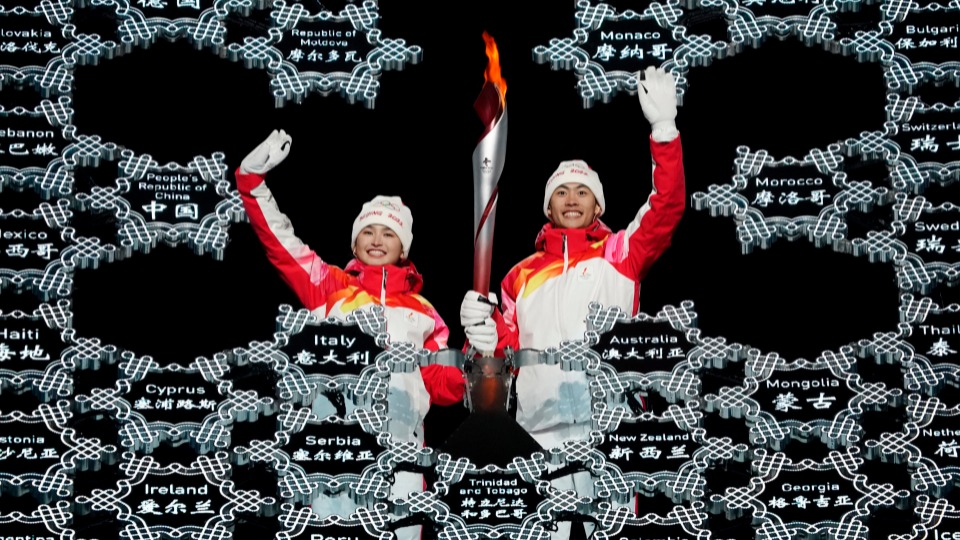
“Fifty-six constellations, fifty-six flowers in bloom;
Fifty-six ethnicities, brothers and sisters in one family…”
— Lyrics from 爱我中华 (We Love Our China), theme song of The 4th National Traditional Games of Ethnic Minorities, 1991, China.
Thirty-one years after this wildly popular Chinese song for another nationally-celebrated sporting event, these same 56 brothers and sisters were all present, carrying the Chinese national flag out in an emotionally resonating scene during the opening ceremony of the 2022 Beijing Winter Olympics.
Soon after, Dinigeer Yilamujiang, a member of the Uyghur community and Chinese athlete, was one of the two final bearers who lit the main torch. If this was anywhere else in the world, the progressiveness of this opening ceremony would be unanimously celebrated. However, since this is China, the mainstream media of the West have been hell-bent on vilifying everything related to the Beijing Games, making even the most uncontroversial display of a country’s cultural diversity into a political weapon.

The choice to have a Uyghur torch bearer has indeed baffled Western media. For several years, the West has been accusing China of “genocide” against the Uyghur people, despite even U.S. State Department lawyers coming up with scant evidence for it. So a Uyghur torchbearer representing China completely contradicts this narrative and has had mainstream corporate journalists and media personalities spiraling down a surreal rabbit hole of twisted history and cognitive dissonance.
Most eye-catching of all was the bizarre comparisons of the Beijing Winter Olympics to the Berlin Games of 1936 in Nazi Germany. Even the Holocaust Museum got in on the anti-China propaganda action with a tweet comparing the torch relay of Nazi Germany to that of China. Needless to say, this is an outrageous comparison.
Though the torch relay was invented at the Berlin Games, the tradition caught on and has been replicated by every country hosting the games since 1936. The comparison of the Beijing torch relay—but not Pyeongchang, Vancouver, Salt Lake City, or other hosts—to Nazi Germany shows the malicious intent behind such talk. Moreover, the final torchbearer for Nazi Germany was a white, blonde haired, blue eyed “Ayran” man, not a Jew. Thus, the comparison to China’s Uyghur torch bearer somewhat falls apart.
The comparison between Beijing 2022 and Berlin 1936, though utter nonsense, came as no surprise from the corporate-owned media, which has a track-record of pushing anti-communist propaganda through false association to the Nazis. The Berlin Games intended to showcase the Nazi vision of racial superior of the so called “Ayran race,” a plot thoroughly shattered in the very same tournament by the legendary Jesse Owens.

If China wanted to showcase the racial supremacy of the majority Han ethnic group, wouldn’t having a Uyghur torchbearer and uplifting athletes of ethnic minorities be completely detrimental to the cause? Of course, that cause never existed in the first place. Yet the Western media stick with this invented narrative, brandishing the age-old “damned if you do damned if you don’t” rhetoric that was regularly deployed against the Soviet Union, as described by Michael Parenti in his book, Blackshirts and Reds:
“During the Cold War, the anti-communist ideological framework could transform any data about existing communist societies into hostile evidence…. If the churches in the USSR were empty, this demonstrated that religion was suppressed; but if the churches were full, this meant the people were rejecting the regime’s atheistic ideology….”
In the same vein, if China did not have a Uyghur torchbearer, it would be a sign of the ongoing genocide and a display of Han supremacy; when China did in fact have a Uyghur torchbearer, the mainstream media said it was a “distraction.” It was the same old old tricks from the same Cold War playbook, resurrected from the dustbin of history to unleash upon another geopolitically significant power led by a communist government.
Another opening ceremony incident that got a lot of attention it into the headlines and social media was the supposed outrage of South Korean netizens and some outsider over China’s supposed “appropriation” of the traditional Korean dress, the hanbok, when one of the flag bearers of the ceremony wore the dress. Said flag bearer is a member of the Joseonjok ethnic group of Korean origin, and the hanbok is their traditional ethnic attire as well. There are 1.7 million ethnic Koreans living in China whose language and culture are recognized and protected by law.
Such accusations against the Joseonjok Chinese people are as ludicrous as it would be to accuse Mexican, Irish, or German Americans of celebrating their own shared culture as “appropriation.” Of course, the latter would never happen. But since the target is China, the imperialist West is more than happy to see U.S. vassal states like South Korea using liberal verbiage to amplify the anti-China chorus.
Far from being homogeneous, China is home to at least 56 officially recognized ethnic groups. Since ancient times, China has been a multi-ethnic society, with dynasties such as the Yuan dynasty and the Qing dynasty being ruled by ethnic minorities, Mongolian and Manchu respectively. Zheng He, the famous Ming dynasty Chinese explorer who sailed the globe, was a Muslim from the Hui people.

Since the founding of the People’s Republic of China in 1949, many ethnic groups have had their own autonomous regions, such as the Guangxi Zhuang Autonomous Region, Inner Mongolia Autonomous Region, Xinjiang Uyghur Autonomous Region, and the Ningxia Hui Autonomous Region. There are also smaller self-governing autonomous prefectures and counties, a part of China’s extensive policies recognizing and protecting the rights of ethnic minorities. All ethnic groups are part of China and have made their contributions to Chinese history and heritage.
By projecting the West’s own sordid history of racial and ethnic violence onto China, the imperialist propaganda machine not only made itself a laughing-stock to the Chinese people, but also insulted racial and ethnic minorities, as well as oppressed nations all over the world.
As a Chinese saying goes: “The eyes of the masses are crystal clear.” Despite Western media lies, the Beijing Winter Olympics opening ceremony stood as a monument of China’s ethnic diversity, the country’s effort to protect ethnic minority rights, and a celebration of unity for all the world to see.
As with all op-eds published by People’s World, this article reflects the opinions of its authors.

MOST POPULAR TODAY

High Court essentially bans demonstrations, freedom of assembly in Deep South

U.S. imperialism’s ‘ironclad’ support for Israel increases fascist danger at home

Zionist organizations leading campaign to stop ceasefire resolutions in D.C. area

Resource wars rage in eastern Congo, but U.S. capitalism only sees investment opportunity

UN warns that Israel is still blocking humanitarian aid to Gaza






Comments